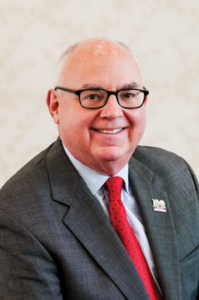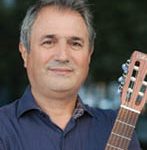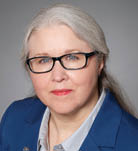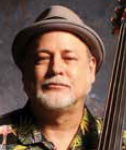The language of music is universal, and the fight to protect the livelihoods of the people who create and perform it knows no borders. As generative artificial intelligence (AI) increasingly ingests and mimics the work of human artists without consent, compensation, and credit, national boundaries have become obsolete.
During 2025, I have worked to strengthen national and international relationships. This year’s Year in Review (on page 10) highlights some of the allies we have worked with and coalitions we are building. In February, we joined the Entertainment Union Coalition in California, and at this year’s Game Developers Conference in March, the AFM announced a new partnership with the Communication Workers of America to organize video game workers.
We continue to work with our allies in the AFL-CIO Department of Professional Employees toward solutions to the ongoing border issues faced by our Canadian members wishing to work in the US under P-2 visas (see AFM Director of Government Affairs Ben Kessler’s column on page 7).
For the first time this year, the AFM was invited to speak at the International Alliance of Theatrical Stage Employees (IATSE) 70th Quadrennial Convention of Delegates. Our members and IATSE members work side by side in nearly every sector of the entertainment industry. Our solidarity in navigating common workplace issues is essential.
Early in 2025, the AFM hosted the UK Musicians’ Union (MU) General Secretary Naomi Pohl and Head of International Services Dave Webster at our office. In return, I had the honor of being invited to speak at the MU Delegates’ Congress in Liverpool, England, where I addressed delegates on our shared challenges, including the impact of AI and securing fair compensation.
Along with AFM Vice President from Canada Allistair Elliott and Symphonic Services Division (SSD) Director Rochelle Skolnick, I attended the FIM 23rd Congress in Geneva, Switzerland. At the congress, I was elected as a FIM vice president with four other musician union leaders from around the world.
During October, we participated in “Music in the Digital Age: Streaming and AI” in Greece. The gathering hosted by FIM and APOLLON (Greek Musicians’ Collective Management Organisation) brought together artists, industry professionals, legal experts, policymakers, and more to shape the future of music rights. Our involvement in the International Federation of Musicians (FIM) is not merely an idealistic goal—it is a strategic imperative. We are actively working to establish worldwide standards for consent, compensation, and credit for all artists.
We saw a clear demonstration of the power of our national and international relationships during the challenging Broadway negotiations in October. We worked closely with our Actors’ Equity Association allies, providing mutual support as both our unions nearly went on strike. Critically, we received powerful letters of support from both the MU and FIM—a testament to the strength and immediate value of our transnational alliances.
Building on this momentum, in November, I met with the leadership and musicians of the Jamaica Federation of Musicians and Affiliates Union (JFMAU). This initial meeting was very interesting, and I look forward a collaborative relationship with our neighbors in Jamaica, with more meetings already planned. Artists worldwide are all bound by a shared, existential threat to the profession and an urgent need to push for protections for all musicians.
Looking Ahead to 2026
Closer to home, we are preparing for the 103rd AFM Convention to be held June 20-23 in Canada’s beautiful capital city of Ottawa, Ontario. This is the first convention held in Canada in more than 50 years. If planning to attend, now is the time to ensure your passports are current as the process can take several months. (Additionally, passports should be valid for six months after your date of travel.) More details will be forthcoming from the Federation in January.
In addition to being a convention year, 2026 will also be busy with critical negotiations. Talks for a successor Integrated Media Agreement (IMA) with symphonic media employers began in November. The IMA is vital, covering more than 8,000 orchestral musicians who work under locally negotiated symphonic agreements. The initial conversations have been productive, but we are currently working through several difficult issues. Negotiations will resume in 2026, and I am confident that we will reach a progressive agreement that benefits both the orchestras and the musicians.
Also on the forefront are negotiations for a successor Sound Recording Labor Agreement (SRLA), set to begin the second week in January. This agreement covers the essential terms and conditions under which musicians are hired to produce sound recordings, and it is one of the most significant agreements for professional recording artists. Negotiation preparations have been ongoing for several months and have included a bargaining group survey to identify priorities, Contract Action Team (CAT) meetings to develop and refine our demands, and open forum member meetings that began this fall.
One centerpiece of the SRLA negotiations will be consent, compensation, and credit for the use of musicians’ tracks in machine learning. In November, AFM leadership met with a contingency of independent recording musicians to discuss how they will best be served as we negotiate a progressive agreement.
In Conclusion
As 2025 draws to a close, I look back with immense pride on the progress we’ve made. The solidarity we’ve seen is inspiring, especially as we stand united against anti-union challenges and an unsettling political climate. I remain committed to strengthening these international ties and working to secure protections for our US and Canadian musicians.
Thank you for your dedication, solidarity, and support this year. I wish you and your loved ones a joyful holiday season filled with peace, music, and celebration.
Read More







